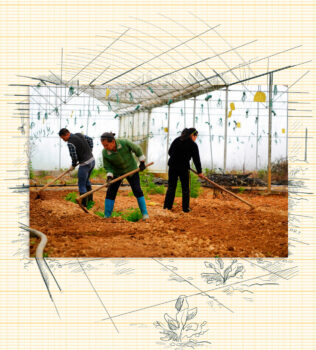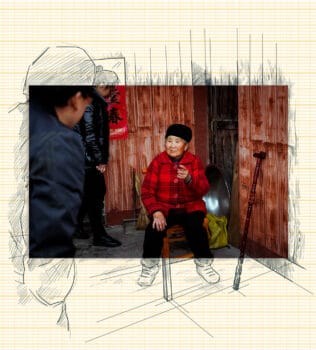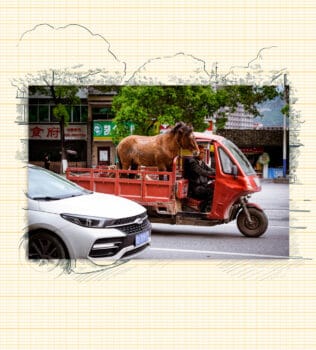Dear friends,
Greetings from the desk of the Tricontinental: Institute for Social Research.
Confounding news comes from the flagship World Economic Outlook report of the International Monetary Fund (IMF). The report highlights many of the pressing issues facing our planet: disruptions in the global supply chain, rising shipping costs, shortages of intermediate goods, rising commodity prices, and inflationary pressures in many economies. Global growth rates are expected to touch 6% in 2021 and 4.9% in 2022, driven by higher global government debt. According to the report, this debt ‘reached an unprecedented level of close to 100% of the global GDP in 2020 and is projected to remain around that level in 2021 and 2022’. Developing countries’ external debt will remain high, with little expectation of relief.
Each year, IMF Chief Economist Gita Gopinath highlights the main themes of the report in her blog. This year, her blog has a clear headline: ‘Drawing Further Apart: Widening Gaps in the Global Recovery’. The rift runs along North-South lines, with the poorer nations unable to find an easy path out of the pandemic-induced global slowdown. A range of reasons cause this rift, such as the penalty of relying upon labour-intensive production, the overall poverty of the populations, and the long-standing problems of debt. But Gopinath focuses on one aspect: vaccine apartheid. ‘Close to 40 percent of the population in advanced economies has been fully vaccinated, compared with 11 percent in emerging market economies, and a tiny fraction in low-income developing countries’, she writes. The lack of vaccines, she argues, is the principal cause of the ‘widening gaps in the global recovery’.

Peasant workers till the land in an organic bamboo fungus company, which was established to help lift Longmenao, a village that is officially registered as poor, out of poverty in Wanshan District, Guizhou Province, April 2021.
These widening gaps have an immediate social impact. The UN’s Food and Agricultural Organisation’s 2021 report, The State of Food Insecurity and Nutrition in the World, notes that ‘nearly one in three people in the world (2.37 billion) did not have access to adequate food in 2020–an increase of almost 320 million people in just one year’. Hunger is intolerable. Food riots are now in evidence, most dramatically in South Africa. ‘They are just killing us with hunger here’, said one Durban resident who was motivated to join the unrest. These protests, as well as the new data released by the IMF and UN, have put hunger back on the global agenda.
In late July, the United Nations’ Economic and Social Council held a high-level political forum on sustainable development. The forum’s ministerial declaration recognised that ‘the crisis caused by the COVID-19 pandemic has laid bare and exacerbated our world’s vulnerabilities and inequalities within and among countries, accentuated systemic weaknesses, challenges, and risks and threatens to halt or damage progress made in realising the Sustainable Development Goals’. Seventeen Sustainable Development Goals (SDGs) were adopted by the UN member states in 2015. These goals include poverty alleviation, an end to hunger, good health, and gender equality. Before the pandemic, it was already clear that the world would not meet these goals by 2030 as projected, certainly not even the most basic goal of eradicating hunger.
During this bleak period, in late February 2021, China’s president Xi Jinping announced that – counter to this general global downturn–China had eradicated extreme poverty. What does this announcement mean? As our team at Tricontinental: Institute for Social Research reported last month, it means that 850 million people had climbed out of absolute poverty (the culmination of a seven-decade-long process that began with the Chinese Revolution of 1949), that their per capita income had increased to US$10,000 (a ten-fold increase in the last twenty years), and that life expectancy had increased to 77.3 years on average (compared to 35 years in 1949). Having met the poverty reduction SDGs ten years in advance, China contributed to more than 70% of the world’s total poverty reduction. In March 2021, UN Secretary-General Antonio Guterres celebrated this achievement as a ‘reason for hope and inspiration to the entire community of nations’.

First Secretary Liu Yuanxue speaks with a local villager during routine home visits in the village of Danyang, Wanshan District, Guizhou Province, April 2021.
Our July study, Serve the People: The Eradication of Extreme Poverty in China, inaugurated a new series called Studies on Socialist Construction, through which we aim to study experiments in the construction of socialist practices from Cuba to Kerala, Bolivia to China. Serve the People is based on ground-level studies of poverty eradication schemes in different parts of China and on interviews with experts who participated in this long-term project. For instance, Wang Sangui, dean of the National Poverty Alleviation Research Institute of Renmin University, told us how the concept of multidimensional poverty is central to the Chinese approach. The concept became a policy through the Communist Party of China’s programme of ‘three guarantees’ (safe housing, healthcare, and education) and ‘two assurances’ (being fed and being clothed). But even here, the essence of this policy is in the details. As Wang put it in terms of drinking water:
How do you classify drinking water as safe? First, the basic requirement is that there must be no shortages in the water supply. Second, the source of water must not be too far, no more than twenty minutes round-trip for water retrieval. Last, the water quality must be safe, without any harmful substances. We require test reports that confirm the water quality is safe. Only then can we say that the standard is met.
Once a policy is crafted, the real work of implementation begins. The Communist Party (CPC) sent out 800,000 cadre to help local authorities survey households to understand the depth of poverty in the countryside. Then, the CPC delegated 3 million cadre out of the Party’s 95.1 million members to be part of 255,000 teams that spent years living in poor villages working towards the eradication of poverty and the social conditions it created. One team was assigned to a village, one cadre to each family.
The studies of poverty and the experience of the cadre resulted in five core methods for eradicating poverty: developing industry; relocating people; incentivising ecological compensation; guaranteeing free, quality, and compulsory education; and providing social assistance. The most powerful lever of these five methods was industrial development, which created capital-intensive agricultural production (including crop processing and animal breeding); restored farmlands; and grew forests as part of the ecological compensation schemes, reviving areas that had become prey to resource over-exploitation. In addition, an emphasis was placed on educating minority populations and women. As a result, by 2020, China ranked first in the world in the enrolment of women in tertiary education, according to the World Economic Forum.
Less than 10% of the people who lifted themselves out of poverty did so because of relocation, which was often the most dramatic instance of the programme. One relocated resident, Mou’se, described Atule’er, a village on the edge of a mountain where he lived before relocating. ‘It took me half a day to climb down the cliff to buy a packet of salt’, he recalled. He would go down the cliff on a rattan ‘sky ladder’, which dangled perilously from the edge of the cliff. His relocation–along with the eighty-three other families who lived there–has allowed him to access better facilities and live a less precarious life.

A local food vendor and user of the Yishizhifu short video platform showcases her cooking in the village of Danyang, Wanshan District, Guizhou Province, April 2021.
The eradication of extreme poverty is significant, but it does not solve all problems. Social inequality in China remains a serious problem. These are not China’s problems alone but pressing problems facing humanity in our time. As we move to capital-intensive agriculture that requires fewer farmers, what kinds of habitations will we produce that are neither in rural nor urban areas? What kinds of employment can be generated for people who are no longer needed in the fields? Can we begin to think about a shorter work week, allowing more time to be civic and social?
Eradicating poverty is not a Chinese project. It is humanity’s goal. That is why movements and governments committed to this goal look carefully at the achievement of the Chinese people. Many of the projects in motion, however, take a dramatically different approach, seeking to address poverty by transferring income (as several South African research institutes advocate). But cash transfer schemes are not enough. Multidimensional poverty requires more than this. For example, Brazil’s Bolsa Familia programme, implemented by former President Luiz Inácio Lula da Silva, made an enormous dent in hunger in that country, but it was not designed to eradicate poverty.
Meanwhile, in the Indian state of Kerala, absolute poverty fell from 59.79% of the population in 1973-74 to 7.05% in 2011-2012 under the governance of the Left Democratic Front. The mechanisms that led to this dramatic decline were agrarian reform, establishing public health and education, creating a public distribution system for food, decentralising political authority to local self-governments, providing social security and welfare, and promoting public action (such as through the Kudumbashree cooperative projects). Kerala Chief Minister Pinarayi Vijayan said recently that his government is committed to eradicating extreme poverty in the state. The next study in our series on socialist construction will concentrate on Kerala’s cooperative movement, focusing on its role in the eradication of poverty, hunger, and patriarchy.
In March, the UN Environment Programme released its Food Waste Index Report, which showed that an estimated 931 million tonnes of food went into waste bins across the world. The weight of this food roughly equals that of 23 million fully loaded 40-tonne trucks. If we let these trucks stand bumper-to-bumper at the earth’s circumference, they would make a ring long enough to circle the earth seven times, or to go deep into space, where billionaires Jeff Bezos and Richard Branson decided to go. The $5.5 billion Bezos spent on a four-minute trip into space could have fed 37.5 million people or fully funded the COVAX programme that would vaccinate two billion people.
The ambitions of Bezos and Branson are not life. Life is the abolition of the harshness of necessity.
Warmly,
Vijay


